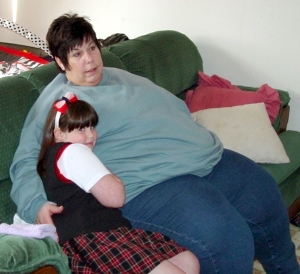 As most of you know I had Lap Band Surgery in 2004. From the day I came home from the hospital I started writing down what I put in my mouth- water, protein, calories, etc. Why did I do this you ask?
As most of you know I had Lap Band Surgery in 2004. From the day I came home from the hospital I started writing down what I put in my mouth- water, protein, calories, etc. Why did I do this you ask? As most of you know I had Lap Band Surgery in 2004. From the day I came home from the hospital I started writing down what I put in my mouth- water, protein, calories, etc. Why did I do this you ask?
As most of you know I had Lap Band Surgery in 2004. From the day I came home from the hospital I started writing down what I put in my mouth- water, protein, calories, etc. Why did I do this you ask?
Because I had a sheet of paper (now it’s a 3-ring binder) of what I was allowed to eat and drink, when I could add things to my food progression, and how many calories and how much protein I was to get in each day. Add to that drinking 64 ounces minimum of water and I had lots to remember.
I have a didactic memory for most things but trying to reconstruct how many 1 oz sips of protein drink I had in a day was beyond my memory skills. So, a little notepad and a pen and I was good.
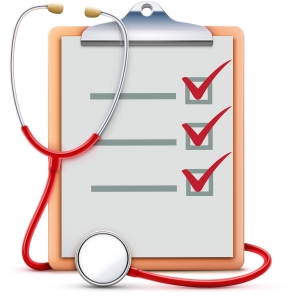 As the weight started falling off and I progressed to solid foods I was excited to be living this life after weight loss surgery. I was bound and determined to do it RIGHT. For me, this meant eating 1200 calories or less per day, getting in at least 80 grams of protein and 64 ounces of water each day. I was working 12-hour days at the time so reconstructing what I ate or drank between phone calls and dealing with customers and vendors also was a no go. Reflecting on that time, I could remember conversations with customers and vendors verbatim, but couldn’t accurately reconstruct my days’ worth of food and drink. Hmmmm, could this be because I NEVER put my nutritional needs first? I didn’t eat to nourish my body before surgery, I ate because I was addicted to eating large quantities of fatty, salty or sugary foods to keep my emotional brain numb.
As the weight started falling off and I progressed to solid foods I was excited to be living this life after weight loss surgery. I was bound and determined to do it RIGHT. For me, this meant eating 1200 calories or less per day, getting in at least 80 grams of protein and 64 ounces of water each day. I was working 12-hour days at the time so reconstructing what I ate or drank between phone calls and dealing with customers and vendors also was a no go. Reflecting on that time, I could remember conversations with customers and vendors verbatim, but couldn’t accurately reconstruct my days’ worth of food and drink. Hmmmm, could this be because I NEVER put my nutritional needs first? I didn’t eat to nourish my body before surgery, I ate because I was addicted to eating large quantities of fatty, salty or sugary foods to keep my emotional brain numb.
Whatever the reason, it became apparent that food journaling was the ONLY way I was going to become the success I had envisioned after weight loss surgery. I could do this…. It was easy when my protein drinks came pre-made, I ate tuna out of a tiny can and 5 saltine crackers at a time. I just needed to look at the labels that were on these products and write down the calorie and protein count. The job was not quite so easy when I was grilling a steak, or some chicken, or shrimp. The water was easy- I just lined up the empty bottles and totaled them at the end of the day.
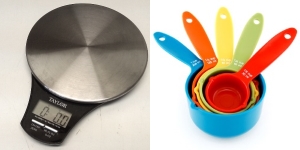 So how was I to deal with the fresh meat/poultry/fish and vegetables? I purchased a food scale to add to my measuring cups and spoons and would weigh out my portions. The weight kept falling off because I was following the instructions on that piece of paper I received at surgery and getting in 1200 calories or less, 80 grams of protein or more and 64 ounces of water or more.
So how was I to deal with the fresh meat/poultry/fish and vegetables? I purchased a food scale to add to my measuring cups and spoons and would weigh out my portions. The weight kept falling off because I was following the instructions on that piece of paper I received at surgery and getting in 1200 calories or less, 80 grams of protein or more and 64 ounces of water or more.
I then got complacent and quit weighing and measuring my food, assuring myself that my eyes knew how much 4 ounces of hamburger were. What do you think happened next? Yes, you got it correct. My weight loss started slowing down and since I began my journey at 424 pounds I had a lot to lose. Out came the measuring cups, spoons and the food scale and my notebook and BAM, it was all working again.
We can make healthy choices but must acknowledge that larger portions of healthy choices will stall our weight loss or, heaven forbid, even start weight gain. You have no idea how many times people have said to me, “I am eating all of the right foods, but I am not losing any weight. I’m doing everything the doctor told me to do. My surgery is not working.” When I ask the question, are you weighing, measuring and journaling everything that goes in your mouth, the honest folks say NO.
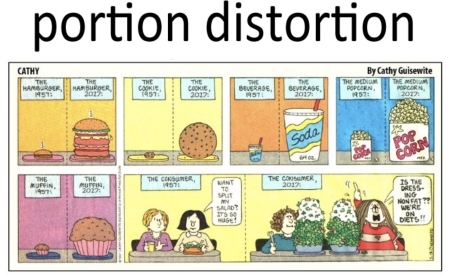
It’s a given that when we don’t measure our portions too much goes on our plate. And, after time, we learn that if we sit there and eat it for a long enough period of time, we can remain members of the CLEAN PLATE CLUB. When we weigh and measure our portions and put ONLY what we are planning to eat on our plates we are just as satisfied. TIP - use a smaller plate so you don’t feel like you are only getting a tiny portion. Let your eyes see that small plate with just the right amount of food on it.
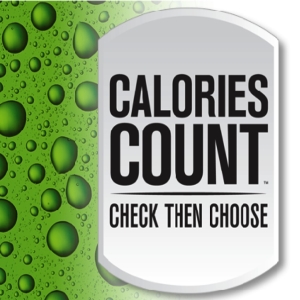 TIP - Eat slowly, chewing each bite 20 - 30 times - yes count the chews if you must and put the fork down between each bite. Notice the flavors and the textures of the food and enjoy dining. This is not a contest to see who can finish their food the quickest. When you savor your food, it can be fuel for your body as well as your soul.
TIP - Eat slowly, chewing each bite 20 - 30 times - yes count the chews if you must and put the fork down between each bite. Notice the flavors and the textures of the food and enjoy dining. This is not a contest to see who can finish their food the quickest. When you savor your food, it can be fuel for your body as well as your soul.
It takes the brain about 20 minutes to catch up with the stomach and know that we’ve had enough. This means that if we overfill our plates we can easily eat too much and regret it 15-20 minutes later, if not immediately.
TIP - Eat when you’re hungry, not by the clock and when you finish your WLS size portion don’t despair; remember, you’ll be eating again in a few hours when you are physically hungry.
Studies have shown time and time again that when we make that educated guess as to what we’re putting on our plate we tend to underestimate.
 Studies have also shown that when we journal what we put in our mouths rather than “remembering” it we catch that cookie, or that coffee creamer, or those French fries we forget if we don’t write them down right away.
Studies have also shown that when we journal what we put in our mouths rather than “remembering” it we catch that cookie, or that coffee creamer, or those French fries we forget if we don’t write them down right away.
Eating in restaurants can be tricky.
TIP - You can order a kid’s meal if they have decent selections, or some places will allow you to order half portions, or, ask the server to put half of your meal in the To Go box BEFORE it is brought to the table.
These are just a few of hundreds of TIPS I have learned and practiced over the last 14+ years since having weight loss surgery.
Please feel free to share the tips you use that are working for you.